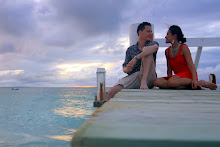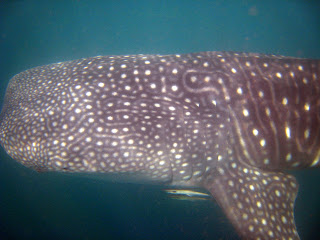What is the size of a bus, swims in the ocean, and is guaranteed to raise your heart rate by 20 beats per minute? It’s a Whale Shark, the biggest fish in the ocean; and Donsol is all about Buntanding interaction! (Buntanding is the local name for Whale Shark).

The Philippines outlawed the fishing of whale sharks 2 decades ago. It’s a tough bit to make happen with whale shark fins going for 30 grand in Hong Kong. However, the eco-tourism approach is working out well. The local people make more money taking tourists on boats to snorkel with the whale sharks, than they make fishing them into extinction. (Vana: especially since middle men make most of the profit from fishing with locals only making enough to survive).
There are specific rules for interaction, and every boat has two spotters, a driver and a guide. Diving is not allowed, although it is possible to see whale sharks at many dive spots throughout Southeast Asia.
 rules for watching whale shark: no camera flash, maintain distance, no feeding, no touching, no riding, etc
rules for watching whale shark: no camera flash, maintain distance, no feeding, no touching, no riding, etcAlthough they look slow and graceful in the videos, you need to swim almost full speed with fins to keep up. The other boats move into position, and dump their passengers. Each group blind sides the other. The shark descends to deeper water when it gets interaction fatigue. The boats pick through the sea of people for pickup. The entire interaction is over within a minute or so. Although it sounds like a zoo, the experience is unforgettably AMAZING!
The sharks are generically classified as small, medium, and big. A small one is the size of a car. A medium one is the size of a full-size pickup. A big one is the size of a bus. Over two days, we see five small ones and one medium size. With a wrist strap on the camera, we are too slow the first day to get a picture. We switch to a neck strap the second day to fix the problem.
We have two particularly memorable interactions. On the first day, we blind side another group and swim with a medium size shark swimming about ten feet below the surface. Although only medium size, there is no way to see the head and tail at the same time. The medium size shark shows little concern for several minutes, and there must be seventy people in the water at the end of the interaction. After 20 seconds or so, I dive below and surface in an impenetrable mass of people; forcing me to withdraw.
On the second day, our boat spots a small shark while the other boats are pretty far away. I follow the guide swimming like mad, and get confused when he stops. I look around and don’t see anything. A few seconds later, I see the head with its mouth open only six feet in front, and only a few feet below the surface. The shark makes a slow turn, and we swim alongside the shark for 30 seconds before it slowly descends into the deep. With the smaller shark only a few feet below the surface, Vana gets great pictures and video of the entire shark. (Note: We didn't use zoom for the pictures or video. We are really that close, and even this small one is really big when you are next to it!)
 "Small" shark spotted on the second day
"Small" shark spotted on the second day Distinctive spot pattern used for photo-identification and research
Distinctive spot pattern used for photo-identification and research Cleaner fish
Cleaner fish
Back to the Bangka for another interaction!
After the turn, we swim behind and then on the opposite side. No wonder they advise 4m safe distance from the tail
3m safe distance from the head and body, camera shakes with Kevin pulling Vana away by the swim trunks















3 comments:
Very cool. I went to the blog...yikes, Kevin's hand sure did get close (or was that yours?). Glad you are having fun. Be safe. :)
Patty
Vana,
I had asked BJ when you were coming back to the US, and she just now answered in an e-mail that you have been back in MV for a while already, and that you guys were tired and had needed to recuperate before the adventure continues.
Harry and I wanted to say we have so enjoyed reading your travelogs and looking at the pictures. The underwater ones are amazing. Whale sharks no less! You are good travelers and your stories and blog posts are fascinating. Please keep us on your e-mail list.
So, when are you leaving, where are you going next, and for how long? Are you keeping within your budget, or it it easy to overspend? When you put all your photos in Picasa web albums, is there a limit on how much space you use there?
Thank-goodness for digtal eh?
Good luck in your further adventures......
Barbara & Harry
Way cool!! I love the videos!
Post a Comment